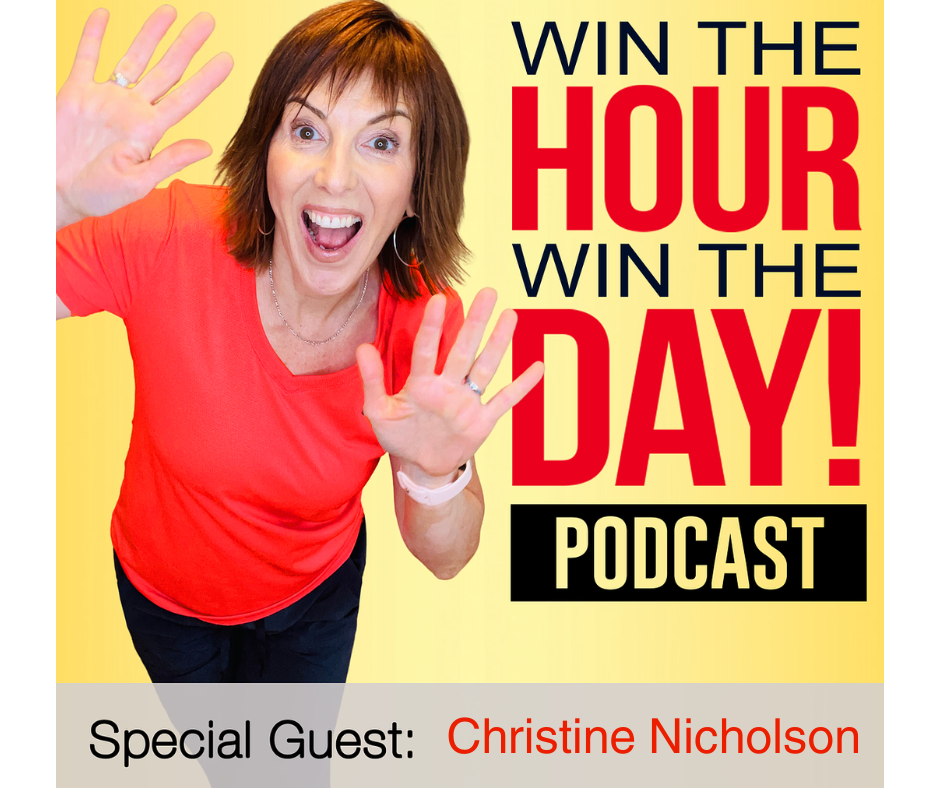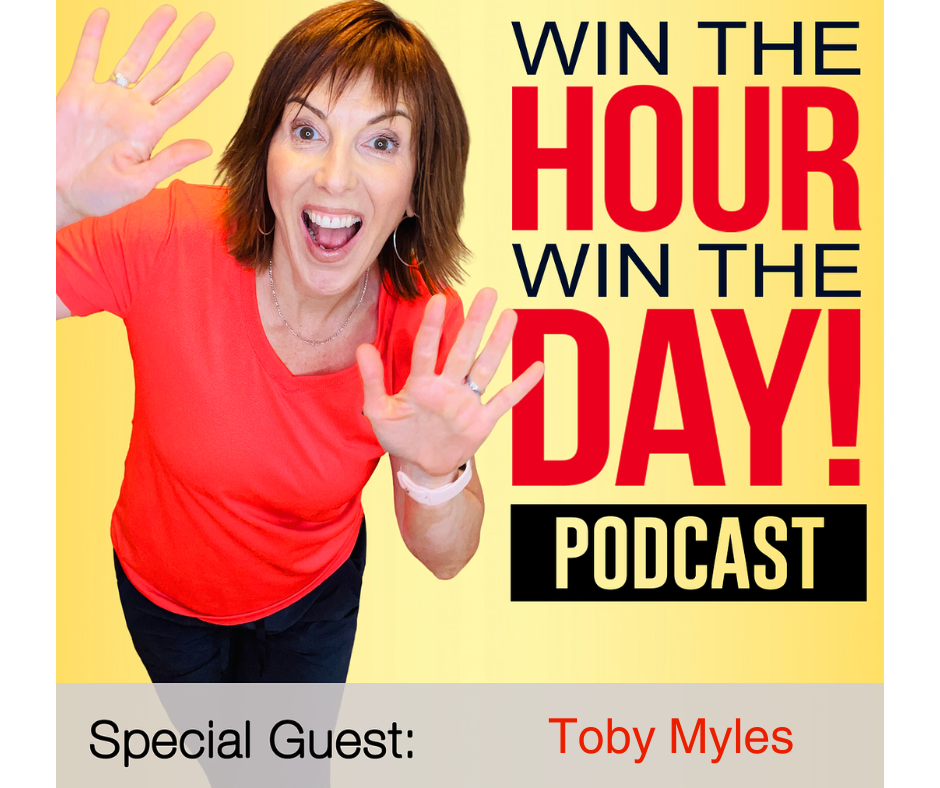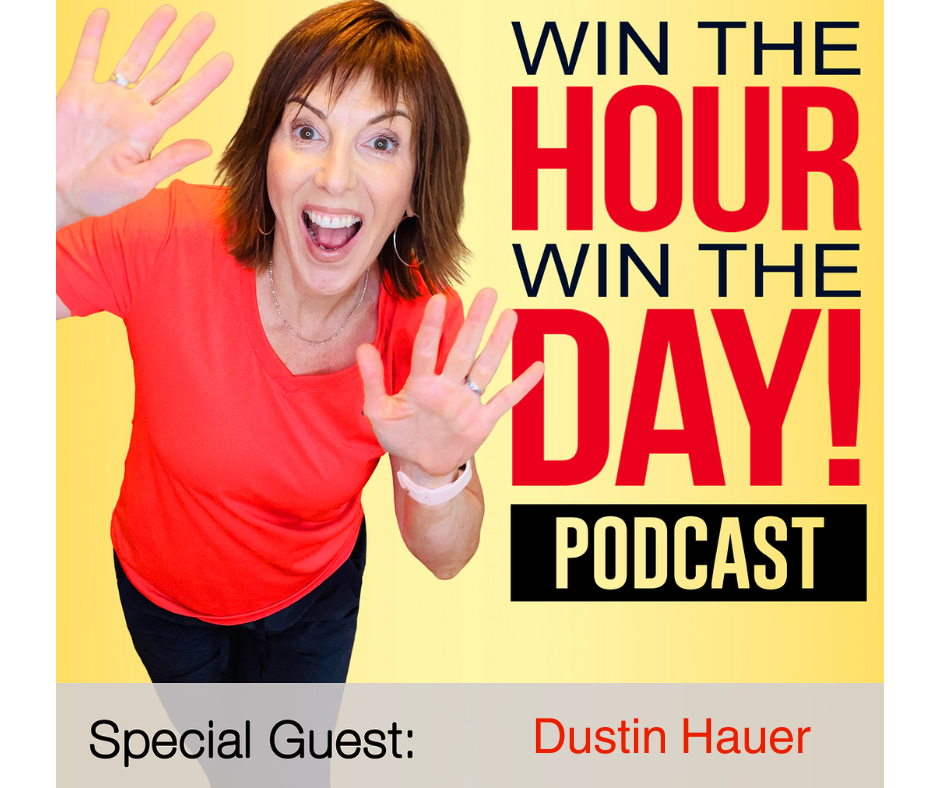Episode Summary
Michele Pariza Wacek gives a whole new outlook on copywriting. Want to get your ideal client to take action.
Learn:
-The limitations to the traditional fear-based copywriting
-How to move people into action easily.
-Copywriting options for your personality style
And so much more!
Win The Hour, Win The Day Winners Circle
https://winthehourwintheday.com/winners-circle-masterclass
Win The Hour, Win The Day! www.winthehourwintheday.com
Podcast: Win The Hour, Win The Day Podcast
Facebook: https://www.facebook.com/winthehourwintheday/
LinkedIn: https://www.linkedin.com/company/win-the-hour-win-the-day-podcast
You can find Michele Pariza Wacek at:
Website: https://michelepw.com/
Facebook: https://web.facebook.com/michelepwbooks/?_rdc=1&_rdr
Email: michele@writingusa.com
LinkedIn: https://www.linkedin.com/in/michelepw/
Win The Hour Win The Day
https://winthehourwintheday.com
Michele Pariza Wacek Podcast
START[00:12:07]Kris Ward: Hey, everyone. Welcome to another episode of Win the Hour, Win the Day. I am your host, Kris Ward. Now today we have Michelle PW in the house and she is going to talk to us about copywriting. Now, hold on, hold on. Before you switch the channel and go do something else, we all have to do some element of copywriting.
[00:12:26] So we’re not talking about the official funnels, copywriting, you know how to get your message out there in volumes and info products. We’re just talking about how to communicate online, to get engagement, to represent yourself. Well, you know what, let me not tell you, let Michelle tell you, cause I’m sure I’m not doing it. Justice, Michelle. Welcome to the show.
[00:12:46]Michele Pariza Wacek: Well, thank you so much for having me. So I’m excited to be here.
[00:12:49]Kris Ward: Okay, Michelle, we chatted quite some time ago. We talked about writing from a copywriting position from a position of using your love versus fear because we do all know we’ve been trained that fear motivates action.
[00:13:03] We need emotion. It’s a much more powerful indicator to move somebody from A to B. Right? So that’s the meme frame of what’s out there. Now tell me why we should be doing that differently. No pressure.
[00:13:19]Michele Pariza Wacek: I’m laughing because part of the idea with love is that I said, I’m not.. like, this is a choice. It’s not so much me telling you what to do. It’s me educating you and offering you a different choice.
[00:13:35]Kris Ward:Well, and I mean that they know that I’m not trying to believe you so we can just skip that part. I’m not here. You’re here to share why you think there are other options.
[00:13:43]Michele Pariza Wacek: Yes, there are other options and the thing is, it’s another way to do it because I know a lot of people.. part of the reason how I got into this is because entrepreneurs,
[00:13:58] a lot. I had a lot of coaches and my friends and colleagues that would say to me, Michelle, you know, we really hate the traditional way of writing copy because it felt really salesy and, you know, thought authentic and arm twisty. And at the time this was a while ago because I’m old and I’ve been in this industry for a while.
[00:14:16] At the time, the only copywriting experts out there we’re like old grizzled, direct response, copywriting men, and their response was, you know, do it, you know, this, this is what works and do it. And if you don’t want to do it, you don’t have a real business. So they didn’t really give a good choice. So I came around and also they’re telling me to do it.
[00:14:34] And at first I said, absolutely not. I’m not going to do it. You know, there’s plenty of good copywriting. But eventually what happened was, I started to realize that there was another way and. It kinda came because I was really trying to figure this out because I felt that there was a better way to do it.
[00:14:51] But, I couldn’t, I didn’t. I felt it, but I didn’t really understand how. And then one day in 2013 or 2014, my friend came out with this I guess, a directory, like a PDF book called Love Based Marketing. And I looked at it and I thought love-based copywriting. And then I thought, well, what would be the opposite?
[00:15:10] Fear-based copywriting? And I was like, zoom, the whole thing, just kind of flowed into me. And that’s when I realized that the whole essence of copywriting and the whole… the sales too, by the way. So if you don’t want to write any copy, you’re probably gonna have to do a sales call so you can take everything I teach here and apply it to sales calls.
[00:15:30] You can also take everything I teach here and apply it to your kids if you have kids, because quite honestly, you’re using a lot of persuasion when you’re trying to get your kids to go to bed at a decent bedtime.
[00:15:38]Kris Ward: Yes, I always tell people who say, they’re not into sales. I say, listen, everything you do’s sales, getting our kids to bed on time is sales that you sell all day long.
[00:15:47] This is about getting people to take action, whether it’s copy, whether it’s sales or whatever. And you’re saying the traditional scare tactics are not the only way. So give us an example, where do we start?
[00:16:00]Michele Pariza Wacek: So the idea is. So, where you start is first of all is you’re going to be tapping into love-based emotions versus fear-based emotion.
[00:16:09] So know right now that if you want to persuade someone to take action, you have to tap into their emotions and what you are probably going to do just automatically is fear. You’re going to say something fearful or shaming, because that’s what you’ve been taught and that’s fine, we’re here to do things a different way.
[00:16:27] So, in order to start persuading with love, you’re going to want to do things a little bit differently. And one of the first steps you’ll want to do is. Really get to really know who you’re talking to, because the more you can actually speak to the person you’re trying to persuade in their language and really hit upon what’s keeping them up at night, the easier this is all going to be. Because if you have like, what they call it like a really, really hot offer.
[00:16:52] Cause the thing is, you can actually take some of these really, really hot offers and just post them on Facebook. Don’t get into all the pain and everything before then. And you’ll convert because you’ve so captured the essence of what people want, the transformation they want.
[00:17:09] And that’s part of how you’re getting into the love-based up as you’re actually tapping into what their dreams are versus the idea of what they’re moving away from the pain part of that.
[00:17:21]Kris Ward: Okay. Let me jump in here. So, then sure I’m getting this correctly.
So we work with entrepreneurs. We’re all about helping entrepreneurs stop working so hard. I don’t believe in grinding it out. I believe that which does not kill you makes you tired. Okay. So we talk about our W.I.N Formula, which I believe you should be in at 60/40 rule, a 60% execution, 40% admin. So, if I was coming out from this, there’s two options.
[00:17:48] One of, listen, you’re working crazy hours, you’re doing all this stuff. Whatever, go through the whole scare tactic of this is not the lifestyle they promised you. Do you want to be doing this two years from now? Only more tired that traditional scare thing, or would I be going saying, I guess the other thing is you’re sitting around with your family.
[00:18:08] You’re not paying attention, they’re talking to you, but underneath that at all, you’re still entrepreneur, your mind’s racing, blah, blah, blah. So that can be a scare tactic. Or could I be saying. Is it a love approach saying, remember that day, that day that you just, you were just relaxed, you were just lounging around you’re with your family.
You were just really looking around and enjoying them. What if you could have more days like that? Is that a love approach?
[00:18:32]Michele Pariza Wacek: Yes, that’s definitely a love approach. And then what you were saying about the pain piece of it earlier there’s I mean, what you said actually wasn’t unlovable either, you know, for lack of a better term, because what I mean by fear really is more like, building pitcher’s up, but like, you really see this with future spinning and shaming.
[00:18:52] So if you take that, like your ideal clients are in pain, your clients are in pain. You know that because they’re really struggling, they’re working way too many hours. And they haven’t gotten it together and they know this and it is bothering them. So we do want to acknowledge the pain.
[00:19:07] We just don’t want to like, when it would be turned into pain when it would be when it would be turning into like fear-based marketing, I think is if you were to say, like the whole cats in the cradle thing, Oh, that’s where you said, your kids are growing up and you’re going to be, it doesn’t.. you’re going to spend, you’re spending so much time with your business, that your kids are going to ignore you and stick you in a nursing home.
[00:19:29] That kind of fear-based playing into the ‘that’s the problem’, but simply acknowledge that’s like, you know what? There’s a better way. Right now you might be really struggling, but there’s a better way to live. And so it’s respectful.
[00:19:43]Kris Ward: I’m a nicer person than I realized. So my fear base wasn’t that mean?
[00:19:47]Michele Pariza Wacek: I know, well, that’s the thing, because a lot of people.. they really dig into this part of, I think what happened is, you know, like if they weren’t getting results, You know, some of the traditional marketers would tell them to really dig in more in the pain. And while
[00:20:00]Kris Ward: I hear that, I hear that a lot.
[00:20:02]Michele Pariza Wacek: Yeah. That’s where you’re going to really turn it into fear-based marketing, but simply acknowledging in a respectful manner their pain is because then they know that you understand them. It’s like, because otherwise they’re not going to know that.
[00:20:16]Kris Ward: So almost like don’t bully them or don’t take it. Yes, we are uncomfortable and this situation, but don’t almost like, you know, when you see those infomercials where whatever, let’s say, they’re selling you a new brush and all of a sudden they show you the black and white picture of somebody trying to brush their hair with the old brush and it’s painful.
[00:20:36] And, you know, it’s just so dramatic and grows against their head and theirs. And they’ve stuck their head out a window for a half hour. So their hair is all tangled and you’re like going well, that’s a bit dramatic. I brushed my hair my entire life. And that has never, maybe your brush is better, but I’ve never been where you’re trying to sell me I was, right. So, that’s the pain thing when they go to that crazy side, right?
[00:21:00]Michele Pariza Wacek: Yeah or shaming. Shaming is another one that they use. So like gaming, a big one at, with shame usually happens. And a lot of even really good hearted people fall into this trap and they know it’s really scary, but you know, like you, you think you’ve got your client signed on and then they email you the next day and say they changed your mind.
[00:21:17] And so then a lot of times they’ll send that shaming emails, like, well, if you’re really serious about whatever it is you wanted to do, you would hire me in a second. That’s also because you’re shaming them to say clearly you’re not taking this seriously or you find the time and you’d find the money here.
[00:21:33] Successful people always find the time and you know, those angles, those are very shaming and that’s another place that this can really show up.
[00:21:42]Kris Ward: Well, wait a sec. That’s not going to work anyhow. Even if they weren’t going to pay before, they’re not going to pay you now. Well…
[00:21:48]Michele Pariza Wacek: Some people, it does work because it depends on what your own wounds are.
[00:21:52] So if you really are, you can get sucked into it, but I can guarantee anybody that comes to you based on you shame them into coming to you. It’s not going to be, it’s not fun for either you or them.
[00:22:04]Kris Ward: No, no, no. We even had conversations in other shows where I say like, I’m even a little bit cautious on the follow-up like if I have to, I really want you to show up, ready to play. When I get, if I’ve gotten those emails the odd time where they, oh, they change your mind. My reply is when the student is ready to teach you. Yeah. I’m like, that’s all I can say. I feel like saying, listen, I wasted my time with you yesterday and you are ready to send you all the paperwork, but I’m like, okay, we gotta leave this gracefully. When the student is ready, the teacher will come. And so you’re..
[00:22:34]Michele Pariza Wacek: You’re very love-based you wouldn’t even know.
[00:22:27]Kris Ward: I’m going to start calling people at someone this morning. They didn’t think I was so love-based, I’m calling her back.
[00:22:43]Michele Pariza Wacek: I called her back and saw that love base experts said I’m love-based.
[00:22:47]Kris Ward: Okay. This is good to know. Okay. So shaming. It’s not a matter of don’t use it cause it doesn’t work, but also be mindful when you don’t realize you’re using it. Right. You think you’re using it.
[00:22:58]Michele Pariza Wacek: You fall into unconscious. Cause if you’re really stuck in and I get it, if you’re stuck in scarcity, you’re afraid you can pay the mortgage.
[00:23:05] You know, I understand why you go in there, but that’s when you have to be, that’s when you really have to stand firm, because the more you suck into that, anytime you bring in money with that kind of emotion, you’re also bringing in the emotion with us, so you’re going to just, so even if, you get that short-term hit, it’s just you pay for it.
Yeah. A few months later, you’re going to start to think maybe this client wasn’t worth it after all. So.
[00:23:34]Kris Ward: Okay. So tell us, we’ve got things that we don’t know what we don’t know. So we get started. Do we not even remember? Did we get started? Did you tell us how..
[00:23:42]Michele Pariza Wacek: Yeah I did, but I didn’t go into it as much.
So with your ideal clients, I wanted actually before, if I could, I’d like to do an example of how to do the shame, how not, I mean, what you did is fine when the teacher comes, but I can also share another example of how to do this without using chains. Okay. This is a real life example, cause it was a couple of clients mine years ago and they had this, they had a mastermind that was kind of about making a quantum leap and, what they had in their FAQ, which was like, what if I don’t have the time and instead of going into the well you’re, clearly you’re not serious.
[00:24:22] They didn’t do that. They said, you know what? When you’re going to have a quantum leap, there’s going to be a time when you’re really trying to step into this big, you’re going to have breakdowns. There’s going to be times where things are just not going to work. Cause that’s part of the process. And you might be in a place where you can’t have the breakdowns.
[00:24:39] Maybe you’ve got a sick parent to take care of aura. A child that’s getting ready for school or whatever. And that’s okay if you can’t, if that’s not you, the share, then don’t worry about it. You know, where we can hug and be friends and I’ll move on. But if you’re ready, if you’re ready to do whatever it takes, to have this quantum leap, then, you know, come on board and let’s, buckle up.
[00:24:59] Let’s do it. So, okay. How the energy with that. So you can still address it, but, you’ve just shifted the energy, which is like, cause it’s basically, it’s just acknowledging that your clients are adults and are not children that you need to manipulate into coming, bring being in your client.
[00:25:20]Kris Ward: No, that’s a really good point. And what it reminds me of is I had to learn not always to be the world’s best person at asking for favors, but I’ve had to learn. So if I was asking somebody for something, I always like to give them a way out. What I was wondering if you could help me with this, but if you can’t like, I’ve got a plan B, this might be a better approach, so I think it reminds me of that where look, give them the grace to have an exit and not feel cornered because then if they step forward and engage with you and become your client. It’s going to be with a different energy and you’re just going to win all around.
[00:26:05]Michele Pariza Wacek: Exactly! Because now you’re having a more committed client, because why on earth you want to work with somebody who isn’t committed with you
[00:26:10]Kris Ward: or stressed. Are you drugging? Yeah. Yeah. I agree with that.
[00:26:15]Michele Pariza Wacek: You’re going to be chasing them and then they might throw that ass for their money back anyway.
[00:26:19]Kris Ward: So that’s a rookie mistake. You do that in the beginning. And I realize, I think I’m paying them to work for them. So, and I also think then you have the opportunity for them to come back because you treated them with grace. Right. Okay. So that’s okay. That’s a good example. Continue.
[00:26:34]Michele Pariza Wacek: Okay. So, well, now that if you, we can go back to what you would ask for, which is how to get started.
So I just wanted to slip that in there because I think that’s important to hear the exam, the positive way to do it. So, yeah. So getting started, in order to really be able to be very specific is your friend. So the more you see, I really want you to get very clear on your ideal client.
[00:27:00] I mean, super clear, which is, really know what, who exactly who they are and what is motivating them. What their dreams are, their desires are. And because the more you know what’s motivating them, the more you could actually speak into what’s motivating them versus like, kind of like a nebulous, they want more money.
[00:27:18] They want more clients, they want something that’s very broad and can apply to pretty much everybody. So the more your clients don’t realize, maybe you could help everybody, but you’re not going to help everybody because not everybody is going to say yes. So the more you can drill down and get really, really specific.
[00:27:39] So one, one exercise that I would encourages to, for you to think to yourself, you know, who is my ideal client and why? And the why part is really important and write it down if you can, because why is going to make it really clear, why you want to do this, and then what’s motivating you, what you want to see in future ideal clients.
[00:27:59] And then the second thing is what’s keeping them up at night, because part of what I like to do with I guess, when you touch on the pain part of the whole thing is if you, if the more you can get really clear on the… you know, cause again, they are in pain. If the pain is real, not talking about the pain is just a spiritual bypass.
[00:28:23] So you want to, but in order to know what it is, you have to really know what it is, specifically what it is. And also the more you can get into their mindset or their language, I mean, because if you’re speaking in their language, they’re going to recognize themselves. One of the biggest mistakes I see people make is people try to mark it up, you know, use cute marketing language
[00:28:45] for everything, because then your ideal clients don’t even recognize what you’re talking about. And so they have no idea that you’re actually talking to them. So the more you can actually get into their language and really feel their energy, the easier this is all going to be, because then you can tailor your specific offer to their problem.
[00:29:02] And that right there is where the magic happens. That’s where you get a really strong, hot offer because you’ve tailored your offer precisely to what was keeping them up at night.
[00:29:13]Kris Ward: Okay. So I think what happens, what you’re saying then if you were really in tune with that, then you maybe don’t naturally default to the fear-based language. So for me…
[00:29:29]Michele Pariza Wacek: If you don’t know how to market it. That’s really what it is, because you don’t know what to say. So then you go into, you know, cause it’s an unconscious thing. So then we go back to like, what, you know, like just kind of shaming or using fear
[00:29:42]Kris Ward: So a little bit when you start pushing instead of pulling.
[00:29:44] So for me, I’m so passionate about what I do because so many of my clients, what they are, they look good on paper. They may have a podcast or a book, or they’ve been in business 5, 6, 7, whatever years. So as a matter of years and you know, they’re, oh, I should be grateful. I’m making money doing all this stuff, but they’re still working way too many hours.
[00:30:02] Right. They still got bloody knuckles. They’re still grinding it out and thinking once I get past this next thing. Right. And, oh, I just have to come in Saturday mornings to just catch up on my emails and Sunday afternoons. I just have to go in and get ready for Monday. Right. This whole thing.
[00:30:15] And what I find so saddening and painful is that they are isolated. They think that, oh, because they are often the go-to person in their family, they do get stuff done. They’re highly efficient, but they think, well, there’s just more to do than can be done because I can’t, I keep thinking, once I climb over this next mountain, if things will be different.
[00:30:34] So that’s the thing that these are the people I’m speaking to because they’re alone late at night, hovering over a computer thinking I promise next week we’ve different, like an attic. So if I speak to that and relate with them, then I don’t need to be pushy and aggressive and make it fear-based because the reality they’re living in has got enough fear in it. I could sort of pull them out of their dark spot with some, you know, some warmth.
[00:31:01]Michele Pariza Wacek: Exactly. That’s exactly it. So then, cause you know exactly what they’re doing. So then you can speak to the solution more like that hot art offer, which is, you know, you can, what if you’re living a business where you get it all done.
[00:31:15] 30 or even just 40 hours a week, you just work normal business and, you’re done and everything is done and you’re making money and you don’t have to do all these late nights and weekend catch ups.
[00:32:26]Kris Ward: So what’s another thing that you see out there that’s being done in a sloppy effort?
[00:32:31]Michele Pariza Wacek: So one thing is the go-to being money and, you know, and money is not like even what you were just talking about.
[00:32:38] Like you’re working with entrepreneurs. So some, a well-meaning marketing person might’ve come through and say, oh, just focus on money. But the thing is that you’re not focusing on money. And what you’re doing is just so much better because you’re focusing on lifestyle and money is there and money’s important.
[00:32:50] And yes, that’s going to come up because obviously the more efficient they get, chances are their income was going to go up, but that’s not the main focus. The main focus is the lifestyle piece of it. So, you know, and there are people who are motivated by just making money like our billionaire class, but not everybody is motivated just by making more money or winning the game.
Most of the time, people are motivated to make money because of what money is going to buy them. So money itself is not the end result. It’s what they’re going to buy them. So that’s why getting to know what is really motivating your client is so powerful because maybe
[00:33:30] their children are everything. So they want to make more money to send their kids to private school or to take summers off and go to like, I’ve got one of my friend’s good entrepreneurial friends to structure her business. So every summer. She’s off. And she goes up to a cabin and they spend a summer, they spend like a month or two months at a cabin by the lake.
[00:33:49] But she’s got to make money during the year in order to pay for that. So that’s what you really want, that’s why getting to know them is so important because just as you know, default, oh, money,just focus on money. It’s like, yes, but not really, because it’s not. Really a lot of people more than, you know, are not, I don’t think are motivated by money because the people who are motivated by money aren’t like in these things trying to figure out how to make more money because they are making more money because that’s their motivation. They might, they probably have other problems, but making money is not the problem.
[00:34:21]Kris Ward: Yeah cause it’s a good point because in the beginning I would say. Get more debt, like work less and make more money. But if, I mean, yes, you really will make more money when you work less. Because now you’re not putting at the end of the day, you’re putting in so many hours of Walmart.
[00:34:41] Greeter is making as much money as you, but the reality is on paper. They look like my clients look like they’re making good money until you add the hours factor. But again, what they really want is I have them coming to me saying like, I got to stop neglecting my husband. He’s been really good for these last 10 years, but I’m running out of excuses or I am missing time with my family or I’ve put on weight because I stopped exercising.
That’s a big one too, right? So that’s a really good point. It’s really easy when they were always told money and sex sells, but that’s not their biggest complaint.
[00:35:12]Michele Pariza Wacek: No, it really isn’t, it’s like a surface complaint. It’s something when they, cause it’s only when you start to talk the deeper that you start to realize that money is it, it’s interesting because money can fix a lot of things, but money.
[00:35:27] And like I said, I don’t know this for certain, but I’m really convinced that it’s really a very, very small percentage of the population that’s motivated purely like the McDuck, with all the gold that he liked to swim around. And so, that is like somebody motivated by money by
[00:35:50]Kris Ward: Well that does lend itself, Michele, to the whole argument, like I know there’s studies after study, after study about workplace satisfaction when your employee that when you feel valued and, you know, people are very loyal.
[00:36:03] I mean, Fantastic team. And we just did the reviews and my gosh, if I ever get an award, all of them are going to accept it for me because I’m not nearly the glowing person that they say I am. But one of the things that they mentioned, and they pretty much said, they’d never leave me was, you know, we, we have processes and super tool kits, and we have a thing for how everything gets done here so that you can keep your mind free and move on to the next thing.
[00:36:26] So when we have these things in play. Like when we get a new client I say in there, oh my gosh, look, our machine works. This is what Kasel did. And because she did this, you know, we did this outreach and now we’ve got this new client. Thanks team. We’ve got another new client. So I’m thanking them because it’s the things in play that we do consistently that brings in this business and they went on and on about how
[00:36:48] they’ve never been anywhere before, where they were given credit for those kinds of things and how valuable they feel and feel like they’re building something, you know? And that’s just like, that’s not about the money that they didn’t mention the money at all. Not once.
[00:37:01]Michele Pariza Wacek: Yeah. What do you have when they do that workplace?
[00:37:02] I know isn’t like money is third or fourth. Like, you know, paying the morays. They want to just feel valued and like they’re contributing to something bigger than themselves and yeah. That’s really a big, that’s a big motivation for employees, but we try to do that too. With our team too.
Who’s been with us forever and because they are and get to kind of hear what their love languages are without asking them and sounding really, really weird. And then..
[00:37:29]Kris Ward: Before you pulled it into HR or another company? Yes. I don’t know how she misunderstood that. I was just looking for a love language, right?
Yes. Okay. We have a few minutes left, Michelle. Tell us the one last thing that we should be mindful of as we wrap up here.
[00:37:46]Michele Pariza Wacek: And then the last thing would be really just your mindset. And I mean, this is all kinds of stuff that we touched upon. And because, I will say that trying to make the shift, and be patient with yourself.
[00:37:57] So this is all kind of, part of it is that this is not easy because there are a lot of unconscious behaviors. Andthis is going to be very stressful. The first time the first one might be first, a hundred times,
[00:38:08]Kris Ward: Like the song goes love hurts.
[00:38:10]Michele Pariza Wacek: Yeah. So, because the thing is, you’re going to want, part of why the fear based thing works is because like, when you send that shaming message to your client, you’re releasing some of the pressure on yourself. So you probably feel better doing that. But the thing is, is that, but that you might feel worse later when you think about it, but you feel better in the moment.
[00:38:30] It’s kind of like if you’re an alcoholic, the first few, you’re drinking a lot and then the next,at the time you feel that, it’s taking the pressure off, but then the next morning you’re feeling a lot of, you know, you’re hungover and you’re regretful
[00:38:43]Kris Ward: Oh that cookie, I always say if you know, people, I never judged some addictions.
Cause if it was like, you shouldn’t have that second cookie, I’d be in prison. Right.
[00:38:50]Michele Pariza Wacek: I know. It is. And that’s it. Yeah sugar is too. It’s like, you know, we’ve all done and then you feel bad. And so any time, so if you look at your patterns of behavior, anything that you do, and then you feel bad about it later is probably something you really have to
[00:39:05] stop yourself from doing initially. And it’s going to feel crappy when you do that. I’m going to tell you right now, it’s going to be, you just have to sit and you have to breathe into that emotion and you have to let it pass. And I guarantee you, it will pass. Once it passes it’s going to be easier to do this in the future.
[00:39:22] And it’s going to be easier to keep yourself from lashing out kind of unconsciously or reacting without you being able to think. Cause the biggest one. Another issue is like we allow our emotions to control our actions. And if we want to stop doing that, we have to stop. We have to make a conscious effort to
[00:39:43] not react and just let the emotion move through us. And then at that point we’re going to be calmer and then we’re going to be able to make proper decisions and take the right action.
[00:39:54]Kris Ward: Yes, my mother used to say when I was really young, she’d say, when you think you’re really, really, really right. Call three people before you do that.
[00:40:06] Listen, listen to me, what happened? She’d say call three people. Okay. Michelle. You’re awesome. Where can people find more of your brilliance?
[00:40:14]Michele Pariza Wacek: So they can go to MichelePW.com has got a link to all my different websites. Cause I’ve got a lot like umbrella sites. And then also I do have a couple of love-based copywriting books out there on Kindle and paperback and even audio.
So, you can find those love-based business.com. Or just search on Amazon or Kobo or wherever you were Barnes and noble.
[00:40:39]Kris Ward: She’s out there. That’s what she’s saying. She’s spreading the love, she is out there. Alright, Michelle, you are awesome. Thank you so much. We appreciate you and everyone else, we will see you in the next episode.
END[00:40:51]
——————————————————————————————————————————————










